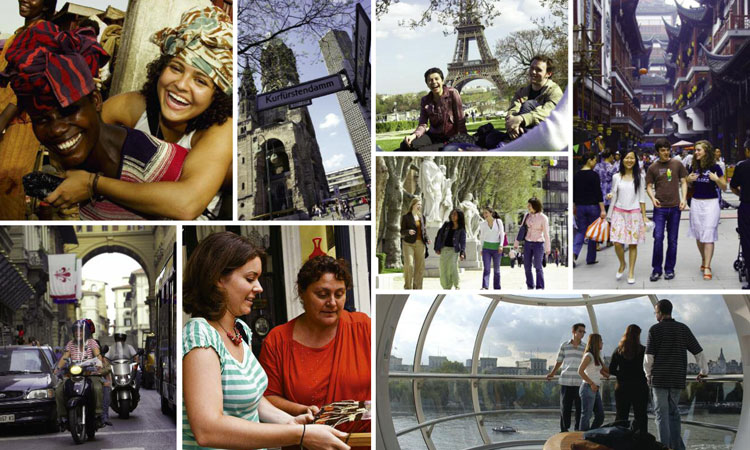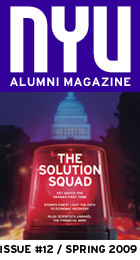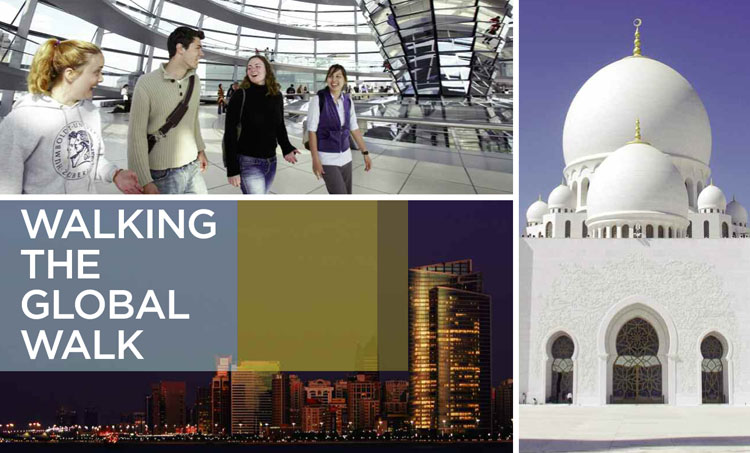Clockwise: NYU students at the Reichstag in Berlin. The Sheikh Zayed Mosque is the third largest in the world. Abu Dhabi skyline at night.
In an effort to truly embrace the notion of a borderless education, NYU builds a second home at an emerging crossroads
by Janet Allon
It was one of the profoundest revelations of the 9/11 attacks, reiterated more recently in Mumbai, and could even be said to be a subtext in the election of Barack Obama as president. A larger-than-ever chunk of the planet’s 6.7 billion people believes the United States is a selfish, narrow-minded bully that cares little about other cultures. Newsweek’s Fareed Zakaria eloquently summarized the problem in his groundbreaking essay, “Why They Hate Us,” published right after the towers fell. He and others suggest that one way to change how the world sees America—and how we see them—is through the most universal of cultural bridges: higher education.
This notion is part of the thinking behind a bold new partnership between NYU and the leadership of Abu Dhabi to build a comprehensive liberal arts and science campus in the heart of the Middle East. When it opens its doors in 2010, NYU Abu Dhabi will be the first such project created by a major U.S. research institution off American soil. With this, NYU and Abu Dhabi will embark on an audacious experiment—one, it should be noted, that is not without risk. But it is also one that President John Sexton sees as a pivotal step in positioning NYU as a truly global university. “It takes global education to a qualitatively new level,” says Alfred H. Bloom, who will soon be stepping down as president of Swarthmore College to become the first vice chancellor of NYU Abu Dhabi. “It will be a university not anchored in a particular region or culture, but one that searches for common ground.”

A FUTURE VIEW OF SAADIYAT ISLAND
The permanent campus (to be completed in 2013) is being built from the ground up on Saadiyat Island, a once desert island just off the coast of the United Arab Emirates, where its neighbors will be new outposts of the Louvre and the Guggenheim Museum. NYU Abu Dhabi will be financed by the Executive Affairs Authority, or EAA, of the Abu Dhabi government and the future campus’s international composition, rigorous academics, and extracurricular activities will be aligned with Abu Dhabi’s ambitious vision to emerge as a leading city in the 21st century. Over time, the site is expected to grow to 4,000 students, admitted according to NYU’s standards of quality.
It’s not surprising that Abu Dhabi was interested in attracting a top U.S. university. Higher education is, in the words of Zakaria, “the United States’ best industry.” With just 5 percent of the world’s population, the U.S. is home to eight of the top 10 universities in the world, and in fields such as computer science, for example, American universities simply leave overseas competitors in the dust. Sure, rising countries like China and India have elite institutions—but coming to America for a college education is still the surest path to success and employability in a high-tech world. This desire for U.S.-style higher education, which is, Zakaria reminds, “good at developing the critical faculties of the mind” and explains “why the U.S. produces so many entrepreneurs, inventors, and risk takers,” is only growing, and fine American universities are answering the call in the Middle East. Cornell, Georgetown, and Carnegie Mellon are all establishing programs in the region, though none on NYU Abu Dhabi’s scale. For NYU, having Abu Dhabi as a partner in this venture was “almost as obvious as the move,” Sexton says. “We share important perspectives, a mindfulness of history but a focus on the future, and a belief that there’s an evolving global dynamic that is going to bring about the emergence of a set of idea capitals around the world.”
While this new education project may be unprecedented, NYU has always been an international kind of place. Deeply intermeshed with the fabric of America’s most polyglot city, the university has educated immigrants, and the children of immigrants, at rates exceeding those of just about any other institution. It has also long maintained a rich, evolving, and ever-more-popular study-abroad program—its first outpost, in Madrid, recently celebrated its 50th anniversary. And during Sexton’s tenure, the percentage of NYU students who avail themselves of study-abroad opportunities has risen to 42 percent from 23 percent. For the past several years, NYU has sent more students abroad than any other American university, and students can now pursue their studies at any one of 16 locations on five continents—London, Paris, Madrid, Prague, Hong Kong, Florence, Buenos Aires, Ghana, Zurich, Beijing, Shanghai, Singapore, Dublin, Havana, Capetown, Berlin, and soon, Tel Aviv.
The fact that the programs in both Latin America and Asia are among the most heavily subscribed is a reflection of the distance traveled from the old study-abroad model, in which students would take a leave of absence to visit a foreign country—usually in Europe—to immerse themselves in the language and local culture then return to the home university to resume progress toward a degree. Increasingly over the years, NYU has offered programs that transcend the usual semester or summer abroad. One distinction is that students may make meaningful progress toward many kinds of degrees—not just foreign languages—while studying abroad, making this part of their education friendlier to those learning, say, math or biology, or those who wish to graduate on time.

Clockwise from left: GHANA, BERLIN, PARIS, SHANGHAI, MADRID, LONDON, BUENOS AIRES, FLORENCE
Some opportunities are even more comprehensive: The Tisch School of the Arts and the School of Law both operate degree-granting graduate programs in Singapore, and the Leonard N. Stern School of Business has joint degree programs in Hong Kong, London, Paris, and Zurich. Jiri Pehe, who directs the program in Prague, says that the university is seen as something of a trendsetter in other parts of the world. “Expanding its efforts to become a more global university gives NYU a very specific identity,” he says. “In this area, it is far ahead of other major American universities.”
The idea of the college as portal to the much larger world is what draws many students to NYU in the first place. “More and more, they want to make connections between vastly different places, be able to move between different cultures, and develop the confidence and the humility to leave their cultural assumptions behind,” says Ulrich Baer, vice provost for globalization and multicultural affairs and professor of German and comparative literature. This trend signals, in part, the rise of a generation of globe-trotting, intellectually curious students—a generation that pollster John Zogby has dubbed the “First Globals.” But it also reflects the fact that many industries now require a more global vantage point. “If a bank is hiring, it’s probably better if you’ve spent a half a year in China, studying business and also learning at least some Mandarin,” Baer says. As recently as the 1990s, American students could reasonably assume that English would be the lingua franca in the world of international business. Not so anymore. “You can still do business in English throughout the world, but not quite as well,” Baer adds.
David Sharon (STERN ’10), a business student from Israel, is already studying abroad by virtue of pursuing his education in New York, but he wanted to enhance this by going somewhere even farther outside his comfort zone. He chose Shanghai, where the classes are sensibly geared toward China’s rapid modernization. “I learned the most by becoming a consumer in the country,” Sharon explains. “From negotiating in the markets for souvenirs to going to dinner with Chinese students I met on campus, I started to learn the rules of negotiation and expected cultural behavior in business and social settings. I expect these soft skills to help me in the future.”
And travel abroad can often lead to more travel abroad. It did for Fareed Mostoufi (TSOA ’08), who completed a television writing major with a minor in Spanish. He spent a summer in Madrid, taking acting and journalism classes, and in the process getting “much more interested in the Spanish language.” When he came back, he landed a Fulbright English Teaching Assistantship in San Miguel de Tucumán, Argentina.
Another mark of Zogby’s First Global generation is their extra-border perspective, an offshoot of the technology they have grown up with. “First Globals,” Zogby writes, “want borders pushed back because in their own minds they exist in the largely borderless world of the Internet.” NYU Abu Dhabi will put this perception to a test and will help refashion the university as a somewhat decentered institution, one in which two portals—one in New York, one in Abu Dhabi—offer access to what President Sexton has called the first “global network university.” In this new system, students from all over the planet can receive the imprimatur of an NYU education while moving easily among any one of the far-flung sites.

CREATING NEW KNOWLEDGE IS CENTRAL TO NYU ABU DHABI
It’s quite a concept. And, naturally, it has its critics. There are those who worry that creating a second campus will drain Washington Square of much-needed financial resources and energy, and there are those who worry that the NYU brand will be in danger of dilution. “I think the development of a global university has terrific potential, but there are quite a few pitfalls,” says Craig Calhoun, University Professor of the Social Sciences. “We need to make sure all of our parts share in the achievement of intellectual excellence that is at the core of a research university.” Sexton and others point out that NYU Abu Dhabi is funded separately—and entirely—by the EAA, so it won’t have any effect on resources in New York. In fact, the Abu Dhabi campus and financial support will provide new research, teaching, and faculty recruitment opportunities both from NYU’s existing faculty as well as from external recruitment sources.
One of the first to sign up for a semester in the U.A.E. was Una Chaudhuri, professor of English and drama, who sees a unique opportunity to create an arts curriculum in a place not yet saturated with Western culture. While there is an emerging visual arts and design movement in Abu Dhabi, Chaudhuri notes, theater and other art scenes are still developing. Having grown up in India, she’s especially aware of the need to frame lessons in the right cultural context but is anxious to examine student reaction to American trends. “The energy there is very attractive,” Chaudhuri says, observing that the youth culture is increasingly exploratory and experimental. “We really need to look for meaningful ways to interact with this part of the world. I think this is a visionary project not just for NYU, but for American higher education.”
“There is no question that we will learn something by being in Abu Dhabi and by being in the Middle East,” Baer agrees. “We may evolve into a different university. I would describe it as a calculated risk.” The move reminds Baer of when, in 1969, Yale College decided to admit women, arousing heated debate and calls that it would change the Yale experience or compromise the brand. But Baer believes that this speaks to the very foundation of the academic mission. “Education is not a product you are selling,” he argues. “It’s about bringing in voices.”
PHOTOS TOP CLOCKWISE: © BOB HANDELMANN; GETTY IMAGES; CORBIS. ILLUSTRATION: © TDIC. PHOTOS MIDDLE: LONDON, MADRID, PARIS, FLORENCE © BOB HANDELMANN; BUENOS AIRES, SHANGHAI, GHANA © ILENE PERLMAN. PHOTO BOTTOM: CORBIS
NYU Abu Dhabi's permanent campus is being built from the ground up on Saadiyat Island, where its neighbors will be new outposts of the Louvre and the Guggenheim Museum.
"[NYU Abu Dhabi] will be a university not anchored in a particular region or culture, but one that searches for common ground." -Alfred H. Bloom








